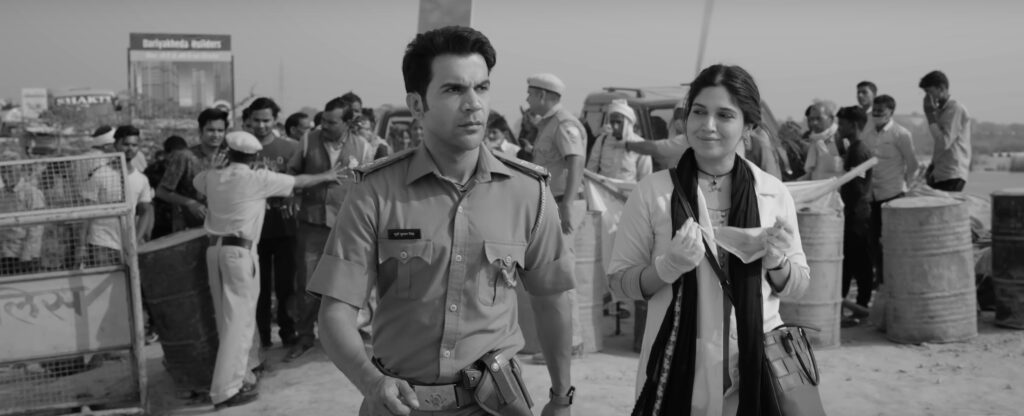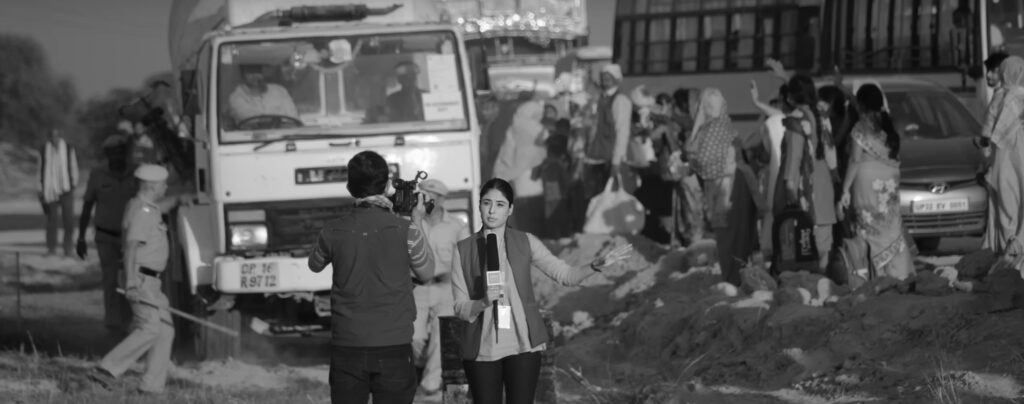April 5, 2023
by Carla Hay

Directed by Anubhav Sinha
Hindi with subtitles
Culture Representation: Taking place primarily in Tejpura, India, in March 2020, the dramatic film “Bheed” (inspired by real events) features an all-South Asian cast of characters representing the working-class, middle-class and wealthy.
Culture Clash: After the Indian government shuts down its state borders during the COVID-19 pandemic lockdowns, several working-class migrants try to go home, but caste systems play a role in who will get to cross those borders.
Culture Audience: “Bheed” will appeal primarily to people who are interested in watching realistic dramas about how the COVID-19 pandemic lockdowns affected people in India.

“Bheed” offers a realistic and sometimes alarming look at how social class structures and prejudices can affect people in a crisis. It’s a rare COVID-19 pandemic drama that isn’t crassly exploitative of this deadly pandemic. In fact, it can be argued that the movie is fairly restrained in showing all the true horrors that occurred when thousands of people in India were stranded, abused and/or killed when the Indian government ordered a 21-day shutdown of state borders within India, beginning on March 24, 2020.
Directed by Anubhav Sinha (who co-wrote the movie’s screenplay with (Saumya Tiwari and Sonali Jain), “Bheed” has fictional characters, but the scenarios in the movie are very accurate to what was shown and reported in the news media. “Bheed” means “divided crowd” in Hindi. And the divisions are mostly cast divisions. The movie was artfully filmed in black and white, as if to give this story a more timeless look and to put an emphasis on how bleak these conditions were.
“Bheed” has a central protagonist who is supposed to be the “hero” of the story, but the movie is told from various perspectives. All of the principal cast members in “Bheed” give very good performances in telling this story that can resonate among many different cultures. It’s a stark reminder of how a pandemic can bring out the best and the worst in people.
In “Bheed,” police inspector Surya Kumar Singh Tikas (played by Rajkummar Rao) has recently been promoted. And his first day in his new position just happens to be the day he is put in charge of a police checkpoint in Tejpura, India, on March 24, 2020. That was the day that the Indian government sealed state borders within, in order to prevent the spread of COVID-19. It was a controversial decision because it left thousands of people stranded, with those who weren’t able to afford food, shelter and transportation suffering the most.
The pandemic lockdowns shut down several business that left working-class migrants out of a job. With no work available, many tried to go back home but were prevented from doing so at the border. These sealed borders caused traffic jams, chaos and an increase in criminal activities. Many of these migrants walked hundreds of miles foot. Nearly 9,000 people were reported killed by sleeping or passing out from exhaustion on train tracks and getting run over by trains. An untold number of people died from police brutality and other crimes.
Surya is someone who knows all too well how people from lower castes are often mistreated. His family is from a lower caste, and he admits to a few of his co-workers that his father changed the family’s last name to Singh to hide this lower-caste status. Surya is in a loving relationship with Dr. Renu Sharma (played by Bhumi Pednekar), who works at a local hospital. They are engaged to be married, but Surya knows that Renu’s father doesn’t approve of their relationship because of Surya’s lower caste. Renu’s father is pressuring her to wed someone else in an arranged marriage.
“Bheed” shows several people who come into contact with Surya in some way during the ordeals that are shown in the movie. Ramadeen “Ram” Singh (played by Aditya Shrivastav) is a nasty-tempered subordinate of Surya. Ram doesn’t even try to hide his prejudice against people who are very poor. His bad temper comes out in horrific ways through unwarranted police brutality. Surya is disgusted by Ram and his brutal tactics and stops him as often as he can. but Surya can’t be everywhere at once.
An unnamed girl who’s about 14 or 15 years old (played by Aditi Subedi) is one of the migrants who has been prevented from crossing the border. She works as a maid and sometimes sell jewelry. She is traveling with her alcoholic father (played by Omkar Das Manikpuri), who frequently steals her money to by alcohol.
This father and daughter were traveling with several other migrants who were killed when they fell asleep on train tracks. The only transportation that this father and daughter can afford is by bicycle. But in an act of desperation, the two of them make the dangerous decision to be smuggled with other migrants inside a concrete mixer.
Balram Trivedi (played by Pankaj Kapur) comes from an upper caste, and he works as a security employee who is transporting several adults and children by bus. Because of his upper caste, Balram is very arrogant and thinks the border rules should not apply to him. He tries in vain to talk the border officials to let him pass through the border. Later, when his passengers are desperate for food and water, he rejects food offered by some Muslim strangers because he erroneously blames Muslims for spreading COVID-19.
Geetanjali (played by Dia Mirza) is an affluent woman is insists on crossing the border because she wants to be with her underage daughter. Geetanjali is in a custody battle for this child with her estranged husband. And she wants to get to the daughter before her husband does. It’s not exactly a “life or death” reason, but Geetanjali feels entitled to cross the border because she’s used to getting her way. She treats her compassionate driver Kanhaiya (played by Sushil Pandey) like a lowly servant.
Vidhi Prabhakar (played by Kritika Kamra) is a TV journalist who is reporting on the scene with two camera operators: Nasir (played by Dhawal Pandey) and Raghu (played by Karan Pandit), who have very different personalities. Nasir is more likely to affected by the suffering that he sees around him, while Raghu is fascinated by it and sees it as an opportunity to get exclusive news footage. Vidhi tries to remain calm and professional, but she eventually gets angry at Raghu’s flippant attitude and scolds him about how they shouldn’t let their privileged lives be an excuse to treat the people they are reporting about as less than human.
“Bheed” shows how some of the upper-caste people try to bribe or make threats to the border patrol officer. An appropriately named pushy upper-caste man named Pushpesh (played Yogesh Pandey) tries to use the name of a family member, whom he says is a high-placed government official, as a way for the border officials to make an exception for Pushpesh. That tactic doesn’t work either. Under the command of Surya, the police officers stand their ground in not letting people through, but things inevitably get violent, as tempers flare and people get even more desperate to cross the border.
Renu is working as an emergency doctor nearby, but she occasionally sees Surya on duty when she has to arrives in an ambulance to respond to people who need emergency care. Of course, adding to the tension is the paranoia that anyone in this crowded area could be infected with COVID-19. People who cough or sneeze are treated like potential killers. “Bheed” also shows how false information quickly spreads on social media. (Facebook is given the name Fakebook in the movie.)
“Bheed” ramps up the tension in very effective ways to show how people from different backgrounds and with different agendas can react to the same crisis. And no one is really safe—not even the police officers in charge. The movie could have taken a very fake-looking turn at one point in a climactic scene. However, “Bheed” shows in no uncertain terms that that what’s in this unforgettable movie only represents a small fraction of the untold numbers of people in real life who experienced this nightmare of being stranded at the border during a deadly pandemic.
Reliance Entertainment released “Bheed” in select U.S. cinemas and in India on March 24, 2023.
